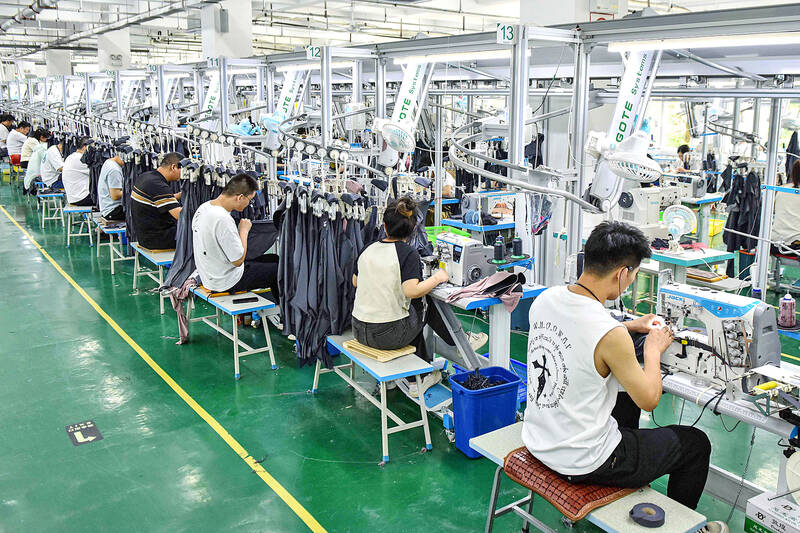China’s factory activity contracted for a second straight month last month, signaling weakness in an area that Beijing is betting on to drive the economy.
The official manufacturing purchasing managers’ index was at 49.5, the Chinese National Bureau of Statistics (NBS) said yesterday. That was the same reading as the previous month and in line with economists’ prediction in a Bloomberg survey. Any number above 50 points is considered an expansion.
A sub-index of new orders at factories inched lower to 49.5 as demand weakened, while a gauge measuring new export orders was unchanged at 48.3.

Photo: AFP
Meanwhile, the non-manufacturing measure of activity in construction and services fell to 50.5, the statistics office said. That compares with a forecast of 51, and a May reading of 51.1.
In a statement accompanying the data, NBS analyst Zhao Qinghe (趙清河) said “the foundation for sustained recovery and improvement still needs to be consolidated.”
Trade tensions have added to the challenges. The US and the EU — two of China’s biggest export markets — have sounded the alarm over a surge in cheap Chinese exports, which they say are unfairly bolstered by Beijing’s massive subsidies. Both have threatened to impose tariffs on China’s electric car exports, along with other sectors where Beijing is leading on price.
The drop in the construction index to 52.3, from 54.4 in May, marked its weakest print since July last year and suggests that state infrastructure spending, a key support for the recovery, lost steam, Bloomberg Economics said. That suggests bolder stimulus might be needed.
“Policymakers will likely focus on fiscal measures to support the economy, given the constraints on monetary easing due to currency pressures,” Guotai Junan International Holdings Co (國泰君安國際控股) economist Zhou Hao (周浩) said.

CAUTIOUS RECOVERY: While the manufacturing sector returned to growth amid the US-China trade truce, firms remain wary as uncertainty clouds the outlook, the CIER said The local manufacturing sector returned to expansion last month, as the official purchasing managers’ index (PMI) rose 2.1 points to 51.0, driven by a temporary easing in US-China trade tensions, the Chung-Hua Institution for Economic Research (CIER, 中華經濟研究院) said yesterday. The PMI gauges the health of the manufacturing industry, with readings above 50 indicating expansion and those below 50 signaling contraction. “Firms are not as pessimistic as they were in April, but they remain far from optimistic,” CIER president Lien Hsien-ming (連賢明) said at a news conference. The full impact of US tariff decisions is unlikely to become clear until later this month

GROWING CONCERN: Some senior Trump administration officials opposed the UAE expansion over fears that another TSMC project could jeopardize its US investment Taiwan Semiconductor Manufacturing Co (TSMC, 台積電) is evaluating building an advanced production facility in the United Arab Emirates (UAE) and has discussed the possibility with officials in US President Donald Trump’s administration, people familiar with the matter said, in a potentially major bet on the Middle East that would only come to fruition with Washington’s approval. The company has had multiple meetings in the past few months with US Special Envoy to the Middle East Steve Witkoff and officials from MGX, an influential investment vehicle overseen by the UAE president’s brother, the people said. The conversations are a continuation of talks that

CHIP DUTIES: TSMC said it voiced its concerns to Washington about tariffs, telling the US commerce department that it wants ‘fair treatment’ to protect its competitiveness Taiwan Semiconductor Manufacturing Co (TSMC, 台積電) yesterday reiterated robust business prospects for this year as strong artificial intelligence (AI) chip demand from Nvidia Corp and other customers would absorb the impacts of US tariffs. “The impact of tariffs would be indirect, as the custom tax is the importers’ responsibility, not the exporters,” TSMC chairman and chief executive officer C.C. Wei (魏哲家) said at the chipmaker’s annual shareholders’ meeting in Hsinchu City. TSMC’s business could be affected if people become reluctant to buy electronics due to inflated prices, Wei said. In addition, the chipmaker has voiced its concern to the US Department of Commerce

STILL LOADED: Last year’s richest person, Quanta Computer Inc chairman Barry Lam, dropped to second place despite an 8 percent increase in his wealth to US$12.6 billion Staff writer, with CNA Daniel Tsai (蔡明忠) and Richard Tsai (蔡明興), the brothers who run Fubon Group (富邦集團), topped the Forbes list of Taiwan’s 50 richest people this year, released on Wednesday in New York. The magazine said that a stronger New Taiwan dollar pushed the combined wealth of Taiwan’s 50 richest people up 13 percent, from US$174 billion to US$197 billion, with 36 of the people on the list seeing their wealth increase. That came as Taiwan’s economy grew 4.6 percent last year, its fastest pace in three years, driven by the strong performance of the semiconductor industry, the magazine said. The Tsai